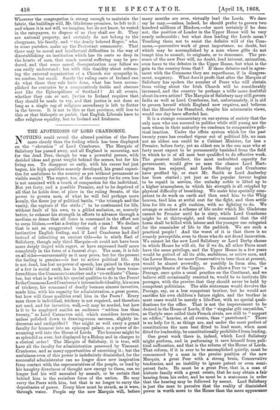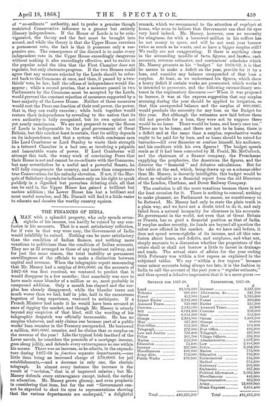THE APOTHEOSIS OF LORD CRANBORNE.
NOTHING could reveal the altered position of the Peers more clearly than the feeling which has been displayed on the " elevation " of Lord Cranborne. The Marquis of Salisbury has passed away, and all England is mourning, not for the dead Peer, though he was a powerful person, with decided ideas and great weight behind the scenes, but for his living son. To disappear so early, with his career but just begun, his high qualities scarcely developed, his grand capaci- ties for usefulness to the country as yet without permanent or visible result I The regret, too, of the country for its own loss is not unmixed with a touch of compassion for the individual. Not yet forty, and a possible Premier, and to be deprived of all that he holds dear, of place in the ruling Senate, of the power to govern men, of what he will feel perhaps more keenly, the fierce joy of political battle, " the triumph and the vanity, the rapture of the strife ;" to be condemned for life, without fault of his own, to a gilded seclusion, or, scarcely better, to exhaust his strength in efforts to advance through a medium so dense that all force is consumed in the effort not to seem lifeless, what a destiny for such a man ! We declare that is not an exaggerated version of the first burst of instinctive English feeling, and if Lord Cranbome had died instead of inheriting an ancient title—he is ninth Earl of Salisbury, though only third Marquis—it could not have been more deeply tinged with regret, or have expressed itself more completely in the form of a funeral elope. The man, it is felt on all sides—unreasonably as it may prove, but for the present the feeling is genuine—is lost to active political life. He is not dead, has lost no power of speech, has gained in the eyes of a few in social rank, has in heralds' ideas only been trans- ferredfrom the Commons to another and a " co-ordinate" Cham- ber, but what is he with his special qualities to do in the Peers? In the Commons Lord Cranborne's inten se individuality, his scorn of trickery, his command of deadly because sincere invective, made him, with his capacity for administration, a great power, but how will those qualities avail him in the Peers ? Every man there is individual, trickery is not required, and therefore not used, and for invective, well,—it may be needed, but how is it to be employed amidst an audience " seldom less than twenty," as Lord Carnarvon said, which considers invective, unless polished down to drawing-room sarcasm, slightly in- decorous and undignified ? One might as well carry a grand faculty for humour into an episcopal palace, as a power of de- nouncing evil into the House of Lords. The humour might be as splendid as ever, but displayed by a Bishop and in charges to a clerical order! The Marquis of Salisbury, it is true, will have all the faculty for administration possessed by Viscount Cranborne, and as many opportunities of exercising it ; but the usefulness even of this power is indefinitely diminished, for the successful administrator can no longer draw new inspiration from contact with the representatives of the people, or lend by his haughty directness of thought new energy to them, can no longer feel his will annealed by assault, or be certain that behind him is the resistless force of the nation. He may carry the Peers with him, but that is no longer to carry the depositaries of power. Every blow must be struck, as it were, through water. People say the new Marquis will, before
many months are over, virtually lead the Lords. We dares say he may,—unless, indeed, he should prefer to govern two•
hundred millions of Hindoos,—for most certainly if he does. not, the position of Leader in the Upper House will be very nearly unbearable ; but what does leading the Lords mean ?' Teaching them not to resist the definite will of the Com- mons,—preventive work of great importance, no doubt, but which may be accomplished by a man whose gifts do not tempt him to assault, to originate, or to denounce. The pre- sence of the new Peer will, no doubt, lend interest, animation, even force to the debates in the Upper House, but what is the. gain to the country from that? If those debates end in agree- ment with the Commons they are superfluous, if in disagree- ment, nugatory. What does it profit that after the Marquis of Salisbury has spoken the number of Peers who will abstain from voting about the Irish Church will be considerably increased, and the country be perhaps a trifle more doubtful about its own action? The Marquis of Salisbury may still govern India as well as Lord Cranbome, but, unfortunately, it is aid to govern herself which England now requires, and believes that the Member for Stamford, despite his aristocratic views, would one day have afforded her.
It is a strange commentary on our system of society that the only men who can succeed in politics while still young are the- men whom in their maturity we condemn to comparative poli- tical inaction. Under the effete system which for the past twenty years has crushed vigour out of political life, no man not an eldest son could be a Cabinet Minister, far less a Premier, before forty, yet an eldest son is the one man who at forty must expect to be permanently banished from the field in which he is of all men best qualified to do effective work. The greatest intellect, the most undoubted capacity for- government, would give no man the chance Lord Hart-- ington has enjoyed, and Lords Stanley and Cranborne have profited by, or start Mr. Smith as Lord Amberley has been started ; yet just as the popular favour begins to be repaid in service, the unlucky noble is lifted up to- a higher atmosphere, in which his strength is all crippled by physical difficulty of breathing. We make him specially com- petent to do work on earth and then send him to the Whig heaven, feed him at awful cost for the fight, and then settle• him for life on a gilt cushion, with no fighting to do. We arrange or endure a scheme of life under which Mr. Gladstone cannot be Premier until he is sixty, while Lord Cranbome might be at thirty-eight, and then command that the old' horse shall be killed with labour and the younger one relegated for the remainder of life to the paddock. We are such a practical people I And the worst of it is that there is no remedy perceptible, even to those who do not dread innovation. We cannot let the new Lord Salisbury or Lord Derby choose- in which House he will sit, for if we do, all other Peers must have the same privilege, and the Upper House in a few years would be gutted of all its able, ambitious, or active men, and the Lower House, far more Conservative in tone than at present, would be almost avowedly, or possibly in form also, the sovereign Senate of the Empire. To allow a Peer to "pass " a. Peerage, once quite a usual practice on the Continent, and we believe still occasionally resorted to, would be to institute life peerages, with the proviso that they should never be held by competent politicians. The able statesman would devolve the Peerage, say, on a less competent brother, but he would not sacrifice his own children's future rights, and the brother in most cases would be merely a life-Peer, with no special quali- fications for the office. That is not the improvement to be. desired in the House of Lords, if the " singular gilt caryatides," as Carlyle once called their French rivals, are still to " support an edifice," heavier, at all events, than " pasteboard." There is no help for it, as things are, and under the most perfect of constitutions the men best fitted to lead must, when most fitted for leadership, be constitutionally prohibited from leading.
One great work there is, indeed, which Lord Salisbury might perform, and in performing it save himself from poli tical suffocation, and that is the reform of the House of Lords. That reform, if it is ever to be accomplished quietly, must be. commenced by a man in the precise position of the new Marquis, a great Peer with a strong brain, Conservative tendencies, and an inability to ignore patent or even semi- patent facts. He must be a great Peer, that is, a man of historic family with a great estate, that he may obtain a fair hearing from his order, and he must be a statesman in order that the hearing may be followed by assent. Lord Salisbury is just the man to perceive that the reality of diminished power is worth more to the House than the mere appearance
of " co-ordinate " authority, and to prefer a genuine though restricted Conservative influence to a greater but entirely illusory independence. If the House of Lords is to be rein- vigorated, the theory and the fact must be brought into accord, and while the theory is that the Upper House exercises a permanent veto, the fact is that it possesses only a sus- pensive one. The consequence of the discord is to make every independent vote in the Upper House exceedingly dangerous without making it also exceedingly effective, and to excite in the popular mind the idea that the First Chamber does not regulate, but only obstructs progress. If the two Houses could agree that any measure rejected by the Lords should be refer- red back to the Commons at once, and then, if passed by a two- thirds' vote, be law, half the odium of independence would dis- appear ; while a second proviso, that a measure passed in two Parliaments by the Commons must be accepted by the Lords, would prevent the constant rejection of measures supported by a bare majority of the Lower House. Neither of these measures would cost the Peers one fraction of their real power, the power, that is, they can really exercise ; while both together would restore their ind.ependenc& by revealing to the nation that its own authority is fully recognized, but its own opinion not yet nearly unanimous. We are not prepared to say the House of Lords is indispensable to the good government of Great Britain, but this much at least is certain, that its utility depends on its independence, and that a system which condemns men like Lord Cranborne or Lord Stanley to waste their strength in a fettered Chamber is a bad one, as involving a palpable and lamentable waste of power. If Lord Cranborne will attempt this task, the weary work of convincing Peers that their House is not and cannot be co-ordinate with the Commons, but may nevertheless be a useful and a powerful Senate, he will fully compensate the country, and more than compensate true Conservatism for his unlucky elevation. If not, if the Mar- quis of Salisbury depends for influence only on his right to speak publicly in a dignified but powerless debating club, all that can be said is, the Upper, House has gained a brilliant but useless addition ; the Lower House has lost a brilliant and most useful member, and Mr. Disraeli will find it a little easier to educate and deceive the worthy country squires.































 Previous page
Previous page